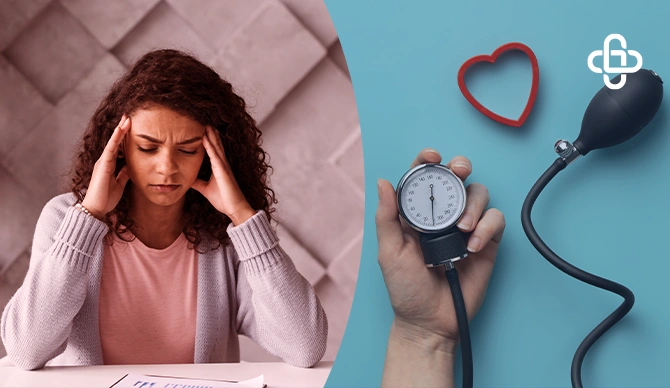Your blood pressure jumps when you’re anxious, but now that bottom number looks weirdly low. Should you be worried?
If you’ve noticed this and it left you scratching your head, you’re not the only one. Anxiety is usually tied to high blood pressure, right? But sometimes, it’s a little more complicated than that.
Let’s clear things up.
Table of contents
What Is Diastolic Blood Pressure and Why It Matter?
In a reading like 120/80 mmHg, that top number (systolic) is the pressure when your heart pumps. The bottom number (diastolic) is what’s happening when your heart relaxes.
If your diastolic pressure drops below 60 mmHg, it’s generally considered low. That doesn’t always mean something’s wrong, but if you’re feeling off, it might be worth checking out.
You might notice
- Dizziness or feeling light-headed
- Weird tiredness
- A bit of mental fuzziness
- Cold hands or feet
If this sounds like you, and especially if it’s happening when you’re anxious or stressed, it’s time to pay attention. Cardiology Care NYC can help. A quick blood pressure screening test might give you answers.
So, Can Anxiety Really Lower Diastolic Blood Pressure?
Yes, it can.
Normally, anxiety kicks your body into fight-or-flight mode. Your heart races. Adrenaline floods in. Blood pressure climbs.
But here’s the twist: sometimes, your body overshoots or crashes later. You might breathe too fast, skip meals, or get dehydrated, and boom your pressure takes a dip.
Common triggers for those drops
- Chronic stress that wears you down
- Panic breathing (yep, hyperventilation counts)
- Exhaustion or even burnout
This isn’t just theory. At Cardiology Care NYC, we’ve seen patients who felt dizzy during stress—not from high pressure, but from surprisingly low diastolic numbers. That’s when tools like a holter monitor come in handy.
Other Reasons Your Diastolic Might Be Low
Anxiety might be part of it, but let’s not forget some other culprits:
- Meds that overshoot their goal
- Not drinking enough water
- Hormonal shifts (thyroid, adrenal issues, etc.)
- Diastolic dysfunction—a heart that’s not relaxing properly
To rule out deeper concerns, we may suggest a heart health screening or even an echocardiogram to get a clearer picture.
When Should You Check In with a Doctor?
If your diastolic regularly dips below 60 and you feel off—don’t wait.
Even mild symptoms like fatigue or brain fog can be clues. If you’re fainting or feeling weak, that’s even more reason to reach out.
Why? Because long-term low diastolic pressure can:
- Reduce blood flow to vital organs
- Increase fall risk (especially in older adults)
- Put extra strain on your heart over time
What You Can Do About It
Here’s what you can control:
- Breathe slowly, especially when you feel anxious
- Stay hydrated (yes, really—it matters more than people think)
- Don’t skip meals
- Move your body, even just a walk
- Use a home monitor and track your numbers
Need a plan tailored to you? At Cardiology Care NYC, we create care plans that consider both your heart and your stress levels.
Conclusion
Anxiety usually raises blood pressure, but not always. Sometimes it causes drops, especially in your diastolic reading. The good news? You’re not stuck with it.
Trust how you feel. If something seems off, it probably is. And there’s help for that.
We at Cardiology Care NYC are here to help you sort through it—with real tests, expert advice, and heart-focused care that makes sense for your life.
Frequently Asked Questions
Is low diastolic blood pressure linked to emotional burnout?
It can be. Chronic stress may weaken blood vessel regulation, causing dips in diastolic pressure during exhaustion.
Do sleep disorders affect diastolic pressure?
Yes. Poor sleep disrupts blood pressure control, sometimes lowering diastolic pressure over time.
Can low diastolic pressure affect my focus?
Absolutely. Reduced blood flow to the brain can cause brain fog, sluggish thinking, and poor concentration.
Is there a connection between posture and low diastolic pressure?
Yes. Standing too quickly can trigger drops in pressure (orthostatic hypotension), especially in sensitive individuals.
Can stress and anxiety cause high blood pressure?
Yes. They trigger hormones that raise both systolic and diastolic pressure, especially during acute episodes.
Can high blood pressure cause anxiety attacks?
Sometimes. Physical symptoms of high BP—like chest pressure—can mimic or trigger panic attacks in some people.
Can stress cause high diastolic blood pressure?
Yes. Ongoing stress keeps blood vessels tight, which may elevate the diastolic reading over time.
Source
- Health Line – What’s the Relationship Between Anxiety and Diastolic Dysfunction?
- Calm Clinic – How Anxiety Can Cause Low Blood Pressure
- National Library of Medicine – Association of low blood pressure with anxiety and depression
- Medical News Today – What low diastolic blood pressure is and how to manage it
Disclaimer
This blog is for informational & educational purposes only and does not intend to substitute any professional medical advice or consultation. For any health-related concerns, please consult with your physician, or call 911.

